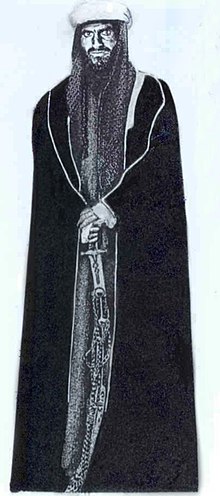Ikhwan
- For Al-Ikhwān Al-Muslimūn, see Muslim Brotherhood. For the Kashmiri organization, see Ikhwan (Kashmir)
The Ikhwan (Arabic for brothers) was the Islamic religious militia which formed the main military force of the Arabian ruler Ibn Saud and played a key role in establishing him as ruler of most of the Arabian Peninsula, in his new state of Saudi Arabia. The Ikhwan were made up of Bedouin tribes. According to Wilfred Thesiger, this militant religious brotherhood declared that they were dedicated to the purification and the unification of Islam. This movement had aimed at breaking up the tribes and settling the Bedu around the wells and oases. They felt that the nomadic life was incompatible with strict conformity with Islam. Ibn Saud had risen to power on this movement. Later the Ikhwan rebelled when they accused Ibn Saud of religious laxity when he forbade them to raid into neighbouring states. After the conquest of the Hejaz in 1926 brought all of the current Saudi state under Ibn Saud's control, the monarch found himself in some conflict with elements of the Ikhwan. He crushed their power at the Battle of Sabilla in 1930,[1] following which the militia was reorganised into the Saudi Arabian National Guard.
Weaponry and Combat Style

The Ikhwan, being irregular tribesmen, relied mainly on traditional weapons such as lances and swords and sometimes old fashioned firearms. Usually, they attacked in the forms of raids which is a style Bedouins had always used in the deserts of Arabia. Those raiders traveled mainly on camels and some horses. Their savage raids on others in and around Najd were merciless. Typically, every male captured was put to death by cutting his throat.[2]
Remarkable Raids
In August 1924, the Ikhwan militia traveled 1600 kilometers (1000 miles) from Najd in modern day Saudi Arabia to attack Transjordan; now Jordan which was at that time under British mandate. Just 15 kilometers off Amman, the raiders were spotted by the British RAF which in turn attacked the Ikhwan using airplanes. The Ikhwan army suffered heavy casualties. It is reported that out of the 1500 raiders, only 100 escaped. Without the help of the RAF, Amman would most likely have been captured by the Ikhwans.[citation needed]
Other raids include, the Ikhwan raid on Southern Iraq in November 1927, and on Kuwait in January 1928 in which they looted camels and sheep. On both occasions, though they raided brutally, they suffered heavy retaliations from RAF and Kuwaitis.
Footnotes
- ^ See Wilfred Thesiger's book Arabian Sands, Penguin, 1991, pps 248-249
- ^ See David Howarth's book The Desert King -- The Life of Ibn Saud, Collins, 1956
See also
